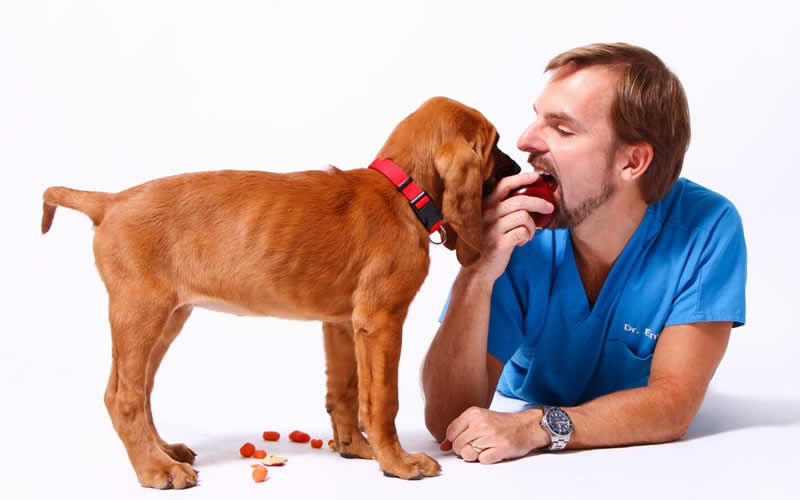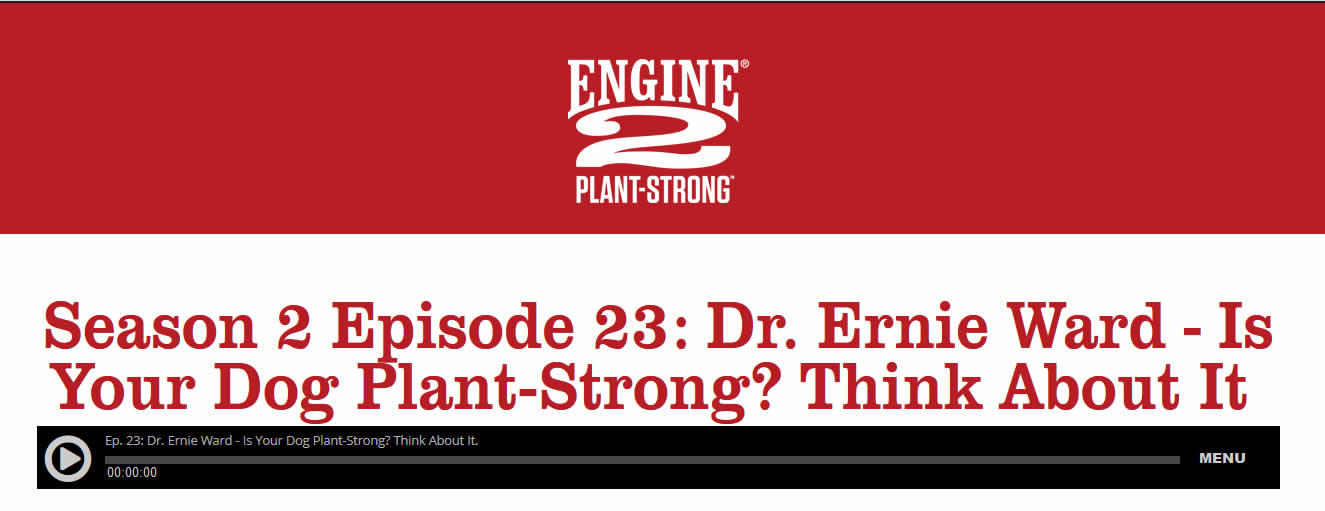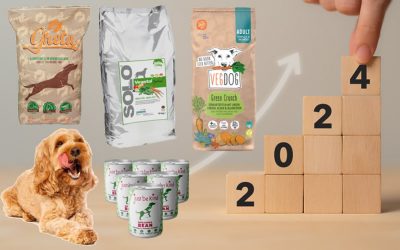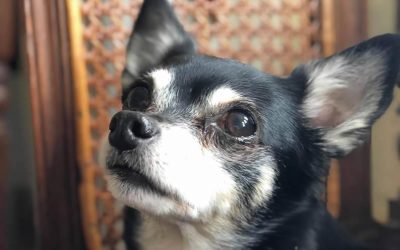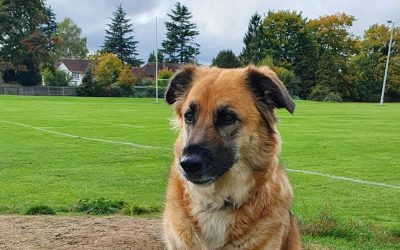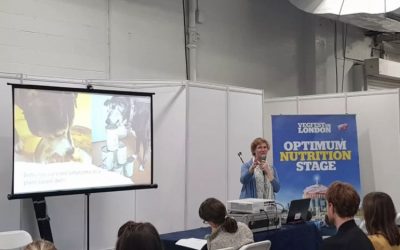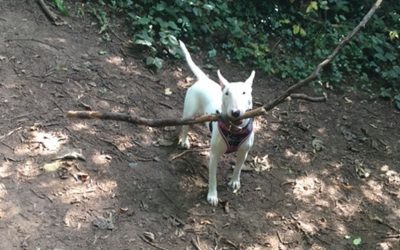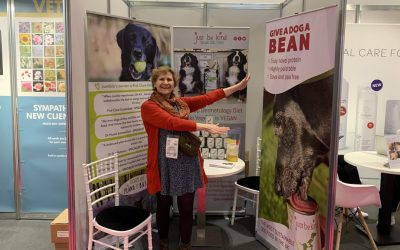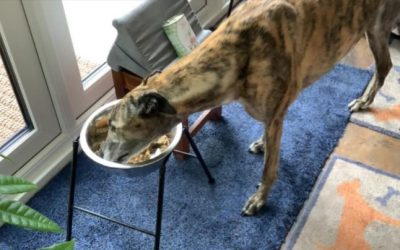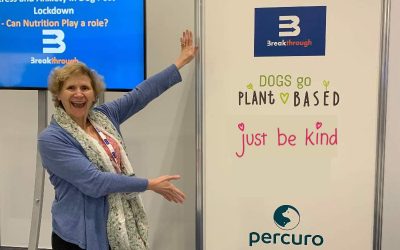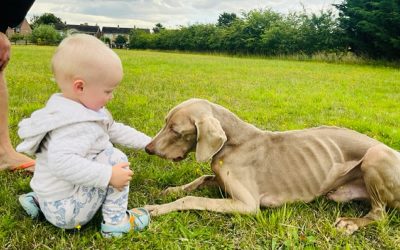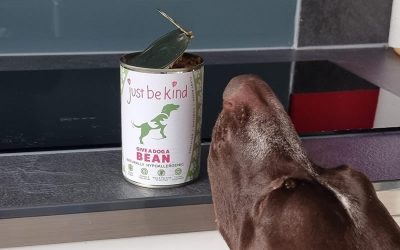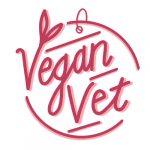I have followed vet Dr Ernie Ward for many years, long before he and I even considered a plant-based diet for dogs. My main aim in 2018, was to tackle the growing obesity epidemic in pets that I found I was faced with everyday consulting at my local PDSA charity. Owners just loved their pets too much and overfed them out of love!
I threw myself into every book or news article possible to see how I could help these owners increase the lifespan and quality of life of their sometimes morbidly overweight pets (sadly due to no choice of their own).
This led me to Dr Ernie Ward and a book he wrote in 2010 – Chow Hounds: Why Our Dogs are Getting Fatter: A Vet’s Plan to save Their Lives. I found his description of the dog food industry fascinating and through reading this book, I just had to find out more. This eventually led me onto plant-based feeding the more and more I looked at it, the more it makes us as vets realise that it is possible and should certainly be encouraged not just for the health of our pets, but for a kinder more sustainable way to feed our planet
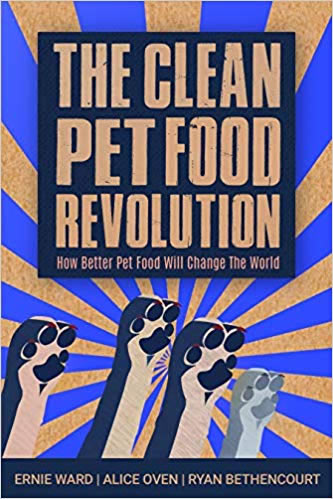 Dr Ernie Ward has gone on to write a fascinating book (together with Ryan Bethencourt and UK ethicist Alice Oven); that was only released in November 2019 – The Clean Pet Food Revolution – the first book of its kind to fully promote a plant-based diet in dogs based on ethical, health and environmental reasons.
Dr Ernie Ward has gone on to write a fascinating book (together with Ryan Bethencourt and UK ethicist Alice Oven); that was only released in November 2019 – The Clean Pet Food Revolution – the first book of its kind to fully promote a plant-based diet in dogs based on ethical, health and environmental reasons.
His latest interview covers all the same issues. If you do not have time to listen to the podcast below, or time to read the text of it also below, then the summary at the end is described perfectly by the interviewer –
“So let me just summarise here, really, really quickly. So if you’re concerned about your pet food safety, let’s go plant-based. If you’re concerned about the carbon pawprint of your pet, then let’s go plant-based. If you’re concerned about your pet and its potential for obesity and diabetes, then let’s go plant-based. And if you’re concerned about animal welfare, let’s go plant-based.”
WE BELIEVE ALL OF THIS TO BE TRUE AND WORTH STRIVING FOR!

SUMMARY OF THE PODCAST INTERVIEW IN TEXT:
Rip Esselstyn:
We have really timely lectures from Dr. Michael Greger, Dr. Michael Klaper, my father Dr. Caldwell B. Esselstyn, Jr., Dr. Saray Stancic, Brenda Davis, Dr. Neal Barnard, Jim Hicks, James Wilks, Gene Bauer, and many more.
Rip Esselstyn:
You’ll learn: How not to diet. How hormones are driven by what we eat. How to live kindly. How to fend off autoimmune diseases. How to survive a pandemic! How timely is that? How every bite matters. How paleo and keto camps are off their rockers. And how our future generations depend on us to get this right.
Rip Esselstyn:
As people have sought companionship during quarantine, or suddenly found themselves with the time to house-train a new puppy, pet adoptions have skyrocketed. It’s a silver lining that people are finding comfort, love, and happiness with a new furry friend. In fact, over 65 million households are homes to dogs and cats. And if you’re anything like me, your pet truly has become a member of your family. And when you love someone, you feed them what you think is the best possible food.
Rip Esselstyn:
Unfortunately, there are a ton of myths out there when it comes to the best diet to feed your pet. And today, we’re going to dispel some of those misconceptions, particularly around meat and protein consumption for your dogs. Just like in humans, overfeeding and underexercising our dogs can cause inflammation, obesity, and disease. But just like humans, it is reversible with the right diet, and you know what diet that is. We’re talking plant-strong diets.
Rip Esselstyn:
Dr. Ernie Ward is a renowned veterinarian, internationally known for improving veterinary medical standards, creating a higher quality of life for animals and promoting healthier habits for pets and people. He’s also the co-founder of Wild Earth dog food, that is a proud supporter of the Plant-Strong Podcast this season. So today, I want to welcome you to Dr. Ernie Ward to discuss his recent book, The Pet Food Revolution.
Dr. Ernie Ward:
The Clean Pet Food Revolution: How Better Pet Food Will Change the World. That’s a mouthful, but there’s a lot in that book.
Rip Esselstyn:
It’s a mouthful, and it’s also, that’s pretty ambitious claim.
Dr. Ernie Ward:
It is. First of all, I want to thank you for having me here today. You’ve been an inspiration to me and millions of others. You’ve helped guide and direct us towards healthier living, a more sustainable living. So just on a personal note, dude, I’m pretty stoked to be here with you. The book is ambitious. It is a bold statement.
Dr. Ernie Ward:
I think what happened for me is, my entire adult life I’ve been a vegetarian and a vegan. Obviously, I think like many people when you have kids, your wife gets pregnant, you slip a little lesson from the veganism more into the vegetarianism, but not in animals. And I thought I was part of the solution, Rip. I thought, “I’m not the bad guy here. I’m the guy who’s saving the world.”
Dr. Ernie Ward:
And then in 2017, a UCLA research study came out that proved that pet food was a major contributor to greenhouse gas emissions, to all those animal welfare ills that I had fought against, to the climate change. That here I was, I thought I’m the good guy, and I realized in 2017 I had to change. Like, “What could I do? I’m a veterinarian. Well, I can start with pet food.
Rip Esselstyn:
Yeah. So you’re a veterinarian, right?
Dr. Ernie Ward:
Right.
Rip Esselstyn:
How long have you been a veterinarian? What inspired you to get into veterinarism?
Dr. Ernie Ward:
Yeah. That’s a great question. I think that for me, I was born into this. I’ve always known, as we say in the Deep South, since I was knee-high to a grasshopper, that I was going to be a veterinarian. There was never any decision, it was just what I was going to be. I can’t tell you. It’s just what I was going to be.
Rip Esselstyn:
Is it because you just loved animals, or?
Dr. Ernie Ward:
Yeah. I think so. I think that there are people that have a strong calling. And I think a lot of the medical professions, may be this is inherent with that, but it’s just when I was little I had a kinship with dogs, and cats, and cattle. Look, I grew up in the South. My entire family still farms. My mother and father are the only two who actually left the farm and got a little college education, and went in the army and all that kind of stuff to escape the farm. So for me, the choice was always just, “How am I going to be a veterinarian?”
Dr. Ernie Ward:
But what led me to this book and to be one of the co-founders of this plant-based pet food company, Wild Earth, is this journey towards optimal health. Now, I mentioned before I’d been a vegetarian and vegan my entire adult life since I left home, because I just couldn’t eat my friends. Here I was committing my life to being a veterinarian, I really found it hypocritical if I can be so bold to think that I would select certain species and kill them, raise them to be killed, and others that I would cherish and do everything to save a precious minute of life at the end of their life. So I never understood that. This was contradictory.
Dr. Ernie Ward:
At the same time, I’m watching my father have his chest cracked open in his late 40s because of a bad lifestyle. Great Southern diet, no exercise, weight gain. I mean, Rip, how many times do we have to hear this story? So that was a wake-up call when I’m a young man. And now as I became an adult, I found myself slipping into these same bad habits, like most middle-aged American males.
Dr. Ernie Ward:
So here I am, I’m about to turn 30. I’ve got a successful veterinary clinic. I’ve got a beautiful wife. We don’t have children yet. And I realized, “Wow, dude, you’re putting on weight. You’re not in good shape anymore.” And so, that began my journey towards becoming Ironman, and becoming certified personal trainer, coach, all that stuff. I’m still a veterinarian, but I’m beginning to explore nutrition and its direct impact on health, and longevity, and performance.
Dr. Ernie Ward:
So all of this. I’m now a vet. And then in 2005, I started saying, “Wait. Why are we seeing so many obese pets?” Pets with obesity. These 20-pound cats. These 105-pound Labrador Retrievers. And that’s when I started the Association for Pet Obesity Prevention, which led me down an entire new pathway towards nutrition and optimizing health for dogs and cats.
Rip Esselstyn:
So you started going down this obesity path for dogs and cats in what, 2005?
Dr. Ernie Ward:
Right, right.
Rip Esselstyn:
2005. And would it be fair to say that you are now like the pet obesity kind of guru on the planet?
Dr. Ernie Ward:
I have been called worse things, Rip, but yes. I think most people associate pet obesity, at least in North America and UK, with me, Dr. Ernie, for good or for bad. But see, the thing about obesity that people overlook, we as humans tend to make it an aesthetic issue.
Dr. Ernie Ward:
So we want to look good in a bikini. You and I want to look ripped at the beach in the summer when we’re surfing. But it’s about inflammation. It’s about a chronic inflammatory state. Which is why you can imagine fast-forward later in life and I’m given the opportunity to formulate a pet food from scratch, you bet I’m going to attack all the inflammatory mediators I can, which is part of why our pet food is made the way it is.
Rip Esselstyn:
One of my heroes in the plant-based movement is a gentleman named Dr. John McDougall.
Dr. Ernie Ward:
Yeah, of course.
Rip Esselstyn:
Right? Okay?
Dr. Ernie Ward:
Yeah, yeah.
Rip Esselstyn:
And he likes to say that there’s really only three species that are overweight. It’s basically humans, it’s dogs, and it’s cats, all that have basically been domesticated. So, I mean, can you explain what’s going on there? Is it just because dogs, cats, and human beings are no longer eating their natural food and we’re eating like overly refined, processed crap and other things? I mean, what’s at the root of it?
Dr. Ernie Ward:
First of all, it’s very complicated. So there’s not an easy answer. Second of all, there’s really the fallacy of nature. So I think sometimes we want to lock ourselves into this belief that, “Oh, if we only fed dogs the way they were originally intended, they’d be healthier.” It’s just not that simple. In fact, there is no past reference because we’re all constantly evolving. So it’s more complicated.
Dr. Ernie Ward:
But really for dogs and cats in the US and in the UK, yes, overfeeding, underexercising are the two primary drivers. But we can’t forget the disease, pet obesity, these are pathological states. These are complete aberrations of the physiology, the metabolic pathway. So once you get to a certain degree of excess adipose tissue, you’re now in a disease state.
Dr. Ernie Ward:
Now leading up to that, you can eat too much, feed too much, exercise too little. But you can also have genetics. We know genetics are a strong driver in both humans and dogs. Evidence is clear. We also have things like hormonal imbalances. And you’ve got all of these cortisol imbalances. You’ve got thyroid hormone in dogs in particular. You’ve got environmental pollutants that I’m getting more and more concerned about, Rip, every day.
Dr. Ernie Ward:
When we look at the role of microplastics and how much they’re appearing in animal meats specifically, we know that these are endocrine disruptors, and they are leading to weight gain. A lot of really emerging evidence around that. Again, what I’m just trying to paint a picture is it’s not just this one thing. I wish it were so simple, but it’s a complicated issue, and we’ve got to be more scientific about it.
Rip Esselstyn:
Right. Let me backtrack for a sec, and just say how excited I am to talk to you today about this book, about your findings, about what we change. If we can change what we feed our dogs and our cats, we can actually do probably one of the best things we can outside of how we feed ourselves, to really like have an impact on our pets’ health, on the environment, climate change, all those things.
Rip Esselstyn:
So before we talk more about dog food, what I’d love to do is talk about the environment. Because as we briefly talked before we jumped on the podcast here, if we’re not careful here, I think what you guys talk about in the book, we’ve got about 12 years to basically get our shit together. Otherwise, we’re basically screwed.
Dr. Ernie Ward:
Right. And there’s a tipping point. This 12-year thing that leading scientists around the world threw out there… Look, I get it. That sounds doom and gloom. Armageddon is upon us. That’s really frightening and intimidating. But what they’re actually trying to say is, there’s a point of no return where the changes then are irreversible. And that’s this 12-year mark.
Rip Esselstyn:
Yeah. And in the book, you guys talk about how… Well, I’m going to ask you some questions. These are little layups, but I want to go in a certain direction. So what percent of Americans have pets?
Dr. Ernie Ward:
Yeah. About 65 million homes right now have got a dog or cat, or a combination thereof. So this is North of half of all Americans love their dog or cat.
Rip Esselstyn:
Okay. So what percentage of the meat that’s consumed in the United States is eaten by our dogs and our cats?
Dr. Ernie Ward:
Yeah. This is what changed my life. It’s about 25 to 30% of all the meat, the animal-derived calories as the scientists say, is consumed by dogs and cats in the US.
Rip Esselstyn:
So 25%. You guys basically say in the book that that’s the equivalent of about 26 million Americans, how much they devour in any given-
Dr. Ernie Ward:
And about 14 million cars, the emissions from driving 14 million cars in a year. This is significant.
Rip Esselstyn:
Right. This would mean that if dogs and cats basically were a country, they’d be the fifth largest country as far as how much meat they consume.
Dr. Ernie Ward:
Right.
Rip Esselstyn:
Which is astonishing.
Dr. Ernie Ward:
Astonishing is right.
Rip Esselstyn:
Right. And so, and as I think you and I are well aware, one of the greatest, probably the number one driver of global greenhouse gas emissions is animal agriculture.
Dr. Ernie Ward:
Right.
Rip Esselstyn:
It’s like we truly by transitioning our pet food from an animal-based one to a plant-based food, we can go a long way towards mitigating those greenhouse gas emissions.
Dr. Ernie Ward:
Right. And listen, here’s the myth I told myself for nearly 30 years, because I’m the good guy, I’m the vegan, vegetarian veterinarian. I’m not part of the problem, I’m part of the solution. So the lie that I told myself, and that the industry tells people and that many people listening to this today believe themselves, is that, “Well, wait a second, Ernie. Most of the pet foods, it’s made from like animal byproducts. So actually, they’re not contributing to the problem, they’re actually maybe helping the problem.”
Dr. Ernie Ward:
And look, if that were true, I would say, “I got you,” but there’s two fallacies embedded in that. Number one, Americans are demanding and paying a premium for more human-grade animal meat. That is the hottest thing ever. They’re also at the same time wanting higher and higher meat protein diets for their dogs and cats. I mean, you can go to a pet retail right now and get a 45, 55-plus percent meat dog food. So that’s not byproducts. I mean, that’s coming straight out of the human food chain.
Dr. Ernie Ward:
The second thing, the fallacy that’s here, is not only are people demanding human-grade, but the profit that the industrialized farming system makes is coming off of pet food. So see, it’s thin. They’re getting a lot of farm subsidies. We go into great detail on how our tax dollars are just propping up these industrialized farm systems, but the reality is they’re making their money selling this stuff to the pet food company. They charge a premium for human-grade meats for dog food.
Dr. Ernie Ward:
So if you can start to chip away at that, you chip away at the profitability. And we’ve seen this already happen to the dairy industry in the US. So again, I’m trying to attack this from two different areas, an economic one, as well as a sustainable alternative protein.
Rip Esselstyn:
Yeah. I mean, you guys go as far as to say that basically pet food is destroying the world.
Dr. Ernie Ward:
Yeah. That’s a chapter heading. And that’s scary. But what I’m trying to do is to awaken American pet- lovers, just like me and you, to say, “Look, we’re part of the problem. How can we help solve it?”
Rip Esselstyn:
Yeah. I mean, this book which I read, which was in insanely eye-opening, is quite a piece of work. At what point in time did you decide, “You know what? I need to write a book. I need to get involved with creating a clean plant-based dog food, and I need to get after this ASAP.”
Dr. Ernie Ward:
Right. Well, it’s serendipity. Sometimes in life when the universe just sort of parts and shows you the path, you take it. And what had happened was, I mentioned this UCLA study drops at the front part of 2017, I am speaking at the first innovation summit, and I’m talking about different ways of doing veterinary medicine.
Dr. Ernie Ward:
And there’s a guy there talking about future foods, named Ryan Bethencourt. And we just connected on a lot of levels. Obviously, at a veterinary conference there aren’t a lot of vegans running around, and we connected on that level. And then I did some fact-checking. He checked with a couple of buddies of his. I checked with a couple buddies of mine. We found out we were legit. And that’s what led us down this. So serendipity really did it.
Dr. Ernie Ward:
The book actually came about as soon as we became like a real company, because I recognize that one of our biggest barriers with selling a plant-based dog food in the United States was to educate the public on the myths of carnivores, and that meat has magical mystical properties, which it does not. And so, I knew that a book would be a part of that story.
Dr. Ernie Ward:
And what I’ve done in this book, of course I co-wrote it with a brilliant animal ethicist from the UK, an old friend of mine, Alice Oven. She’s not old, she’s very young, but she’s a good friend of mine. I unpacked 30 years of my experience and beliefs right here in 300 pages.
Rip Esselstyn:
So, are you telling me that you wrote this in under like a year-and-a-half?
Dr. Ernie Ward:
Yeah, yeah. It really went quickly. So Alice was just an indispensable part of the team. I wanted Alice as part of this because I wanted to get an ethicist’s perspective. I can give you the medicine, the science, I can give you the vet’s aspect. Ryan can share with you all the future biotech, San Francisco, Silicon Valley scene. But I also wanted to make sure that I was being checked at every point that I wasn’t going overboard, like, “Hey. Alice, does this make sense?” And she brought such richness and depth to some of these chapters.
Dr. Ernie Ward:
And what I appreciate about working with Alice is, A, she is the absolute best citation hunter ever. Because I would say, “I read this paper. Oh, it was a couple of years ago. It was from a German researcher. I can’t remember where,” and she would help me find it. So she’s brilliant like that. She would then take some of these chapters, these concepts, and say, “I think you need to punch it up. What’s the real reason?”
Dr. Ernie Ward:
Like when we go into pain, when I started articulating, that first chapter was a little bit dry because I talk about animal pain in terms of the receptors and the neurotransmitters. I’m a scientist. I’m a veterinarian. And then she was like, “I think you really need to lean into more of the feelings and the experiences.” And so that aided, because I went back, and that’s a powerful chapter.
Rip Esselstyn:
Well, so yeah. And I think one of the things that, this might have been Alice that brought this into the book was… and I had no idea… that of everybody that owns pets in the United States, or maybe even around the world, 90% of those pet-owners consider their pets to be part of their family.
Dr. Ernie Ward:
Yeah.
Rip Esselstyn:
I mean, and they love them just like they were a child or part of the family. And that being said, you also want to love them like they’re part of the family. And when you love someone, one of the ways that you show love is by feeding them what you think is the best possible food. Right?
Dr. Ernie Ward:
Right.
Rip Esselstyn:
And so this, to me, is kind of the crux of where I want to go with you is, we seem to be working under this false premise that the current way we’re feeding our dogs and our cats is the best way. We’re feeding them meat, meat byproducts, which they need because they’re carnivores or omnivores, whatever that means, and we can talk about that. But the reality is, is that, so the current paradigm, it’s a false premise. And then when they think of feeding their dogs or cats plant-based foods, they’re working under a false premise because they think that’s not the best way to feed them.
Dr. Ernie Ward:
Right. Yeah. And we tackle that head-on in the book, because I actually say that. This is what I say is because somehow if you feed a plant-based diet to your dog or cat, you’re deficient, you’re a bad pet parent. I mean, this is where that whole ethos is coming from. And it’s just again, it’s predicated on marketing.
Dr. Ernie Ward:
I mean, let’s be clear. The American public, the pet-owning public really of the world, has been bamboozled about this. It’s no different than the way we’ve been bamboozled with our own diet. The sad diet, the standard American diet, we have been brainwashed to think, “Oh, you got to eat meat three times a day. Oh, get a big glass of milk or your bones won’t be strong.” This is all nonsense. This is all marketing. This is all subsidized by big business to keep their coffers full.
Dr. Ernie Ward:
And so, what I try to also do in the book is talk about the marketing strategies that these people use. So the first and foremost thing, people have got to take a step back and say, “Okay, wait.” All this stuff that I’ve been told about human nutrition has now really come under question, under fire. I mean, people like you, your father, Dr. Campbells, I mean all these different researchers, McDougall, all these people have said, “Guys, the research doesn’t support you eating steak three times a day. In fact, it looks like it’s pretty darn bad for you.”
Dr. Ernie Ward:
But yet, that’s what your marketed. If you turn on the television, you have fast food, fast food, fast food, meat, meat, meat. And so, what the American public has got to do is say, “Wait, am I not being manipulated the same way around pet food?”
Rip Esselstyn: Right.
Dr. Ernie Ward:
And you are. You clearly are.
Rip Esselstyn:
Totally. So, let me ask you this question. So we’re being manipulated. So how healthy or necessary then is any kind of animal meat or animal byproducts in our pet’s diet?
Dr. Ernie Ward:
Yeah. Rip, this is a great question, and this is where the language fails us. And the first thing I want to say is, in the book I go into great detail to describe why I don’t use the terms carnivore, and omnivore, and herbivore because science has disputed. It turned them over every time. I mean, even an herbivore, like a rabbit, has been proven now in the past couple of years that Canadian hares actually cannibalize and eat other small rodents in the winter. So there you go. Everything we think we know, we learn that we really didn’t know after all.
Dr. Ernie Ward:
So I think when I get into what we’re talking about with this term omnivore, and what’s the best, the way I look at it as this. Number one, you need nutrients, not ingredients, to thrive. Number two, we haven’t-
Rip Esselstyn:
Can you repeat that?
Dr. Ernie Ward:
You need nutrients, not ingredients, to thrive.
Rip Esselstyn:
So when you say ingredients, give me an example.
Dr. Ernie Ward:
An ingredient is a nutrient vessel. An ingredient is paltry. An ingredient, quite frankly is pee. And that’s why we call them nutrient vessels, because it’s how do you get those amino acids, those vitamins, minerals, whatever nutrient we’re talking about into the body? And it’s just a carrier. So it’s that simple. First of all, nutrients, not ingredients.
Rip Esselstyn:
So that’s, “We need nutrients, not ingredients.” Okay.
Dr. Ernie Ward:
The second thing is, we have culturally implicit ingredient biases. You probably read… constantly, I keep talking about ingredient bias, ingredient bias. And this is a term that I coined several years ago, just because I was desperate to try to communicate with my veterinary colleagues. It’s like, you have a bias against certain things. If I say fungal protein right now, I’ve activated a neural network in your listener’s
brains, that has said, “Wait, maybe a fungus is something that is a mold. Maybe it’s got a negative connotation. I thought fungal infections were bad, like a yeast infection.”
Dr. Ernie Ward:
So we’re trying to say, “Wait a second. We have to overcome implicit bias.” That’s not based on reality or science. So you’re thinking a fungal protein is something really bad, when we’re actually saying, “No, it’s actually really, really good.”
Dr. Ernie Ward:
The same way that South Koreans think eating a dog is fine. I mean, this one will hit home with your listeners. But yet in America, you’re revolting. Right now if you guys could have seen Rip’s face, he draws back. He’s like, “Whoa. What are you talking about, man?” because eating a dog is an ingredient that we would never accept in our culture. So there’s the ingredient bias.
Dr. Ernie Ward:
And then the third and final thing is to understand that food has consequences. Now we often think about food consequences directly on our health or the health of our loved dogs and cats. So it’s a direct consequence. But what we also have to realize are the indirect consequences of the food choices we make. And this is what you do an excellent job of doing is actually saying, “Okay. Look, if you’re going to eat fast food hamburgers three times a day, two times a day, twice a week, then you’re having an impact on farmers, on wages, on water quality, on air quality. I mean, you take your pick, but the consequences expand beyond just you.”
Rip Esselstyn:
Yeah. There’s a huge ripple effect.
Dr. Ernie Ward:
Right.
Rip Esselstyn:
Yeah. Let me dive in a little bit here about maybe some fads that are out there right now. What’s, I don’t think I even heard this until maybe the last three or four years, but grain-free dog food? It’s almost like our dogs when people started going like cuckoo-for-cocoa-puffs over everything gluten-free and grain- free, it seems like somehow what’s good for us might be good for our pets.
Dr. Ernie Ward:
Right. Yeah. And grain-free is a really interesting phenomenon. And if you really look at the history closely, and I try to describe it in the book… we didn’t want to go into tremendous detail because it’s not a grain-free book, but really grain-free gained popularity after the 2007 melamine pet food recall.
Dr. Ernie Ward:
Now you may recall that was a pet food ingredient sourced out of China. They had substituted a toxic compound, something that caused kidney failure, to falsely elevate the protein level. So it tricked the analyzers into thinking that this food had more protein. This was really devious stuff, but it killed thousands of dogs in the US, and so there’s a massive recall.
Dr. Ernie Ward:
And so I think one of the first things that happened was pet food manufacturers in an effort to gain market shares said, “Oh, whatever that stuff was involved with the melamine, we’re going to go the opposite direction.” So there’s market reaction. This is the rise of Blue Buffalo, not coincidentally, because, this is-
Rip Esselstyn:
What’s Blue Buffalo?
Dr. Ernie Ward:
Blue Buffalo is one of the most popular pet food brands in the United States.
Rip Esselstyn:
Okay.
Dr. Ernie Ward:
So it’s massive, multibillion-dollar pet food brand. And so, these are people that capitalized on-
Rip Esselstyn:
Kind of a catchy name.
Dr. Ernie Ward:
Right. No doubt. And you can already see what they’re leaning into-
Rip Esselstyn:
Sure. Totally, totally.
Dr. Ernie Ward:
…ancestral. All this stuff.
Rip Esselstyn:
Yeah.
Dr. Ernie Ward:
So, “We don’t need grains. Dogs didn’t evolve eating grains. They evolved to eat Blue Buffaloes,” or whatever. And again, I’m not here to knock a particular brand, but I’m just giving you a rise of grain-free. What grain-free actually signaled was higher protein. And so when you start to really dive deep and analyze these formulations, and we discussed this in the book, you start to see the protein levels creep up because that was the real market signal. Knock the grains out. Knock the corn, and the wheat and all this koji, and replace it with good healthy meats. And so, that’s where the shift began towards grain- free.
Dr. Ernie Ward:
Now, the pendulum may be swinging back. Look, as a veterinarian, as a person who studies nutrition, I think that grains are fine. I think that they actually are necessary for dogs. Cats, we can argue around some of the nuances there. But the reality is, I think we have to start to, again, suspend some of these ingredient biases that leaned into it heavily, and we have to go back and say, “What are the nutrients that we’re actually needing in the body at any given time to optimize health?”
Rip Esselstyn:
Yeah. This is very personal for me because back in, I think it was 2010… it might have been 2011… we had a Blue Heeler/Border Collie mix, who at the age of nine came down with liver cancer metastasized throughout his body. We had to have him put to sleep. His name was Petey. And it crushed my wife. And we were feeding him, at the time what we thought was the best available, most expensive dog food on the market, because we loved him so much and we wanted to give him what we thought was the most nutritious, complete dog food out there.
Rip Esselstyn:
And unwittingly, that probably contributed quite a bit to facilitating the cancer, I would imagine. But we just made a concerted effort at like that moment that, because we had another dog that was still alive named Tug, who was one in a million. I mean just, ugh. And we’re like, “Okay, we want to talk around as long as possible. We’re just going to feed them all of our leftovers.”
Rip Esselstyn:
And so that’s what we did. And so we would make our own big buckets of bulgur wheat, and brown rice, and different beans and whatnot, and he went from being probably 10 to 12 pounds overweight, within four months he was down to his idyllic weight. He actually was nominated as one of the most athletic dogs in Austin, Texas, and was on the cover of this really cool magazine here in town. And so he lived to almost 16, and all plant-based diet. But we didn’t know. We just were experimenting, trying it. So it’s really validating to hear you say that if you’re feeding your dogs, and we can talk about cats later, but dogs, a plant-based diet, it’s fair to say that you’re doing okay. They’re not going to be deficient.
Dr. Ernie Ward:
Yeah. Absolutely. You’re not going to be deficient, as long as it has the nutrients that they need. So it’s not the ingredient, it’s the nutrients.
Rip Esselstyn:
Yeah. So speaking of nutrients, we talked about protein for a while there. So human beings from everything that I’ve researched, somewhere between five to 10% of our calories should be coming from protein. What is it with a dog?
Dr. Ernie Ward:
Yeah. And this is where the math gets fuzzy, because it really depends on which research you want to stand behind.
Rip Esselstyn: Yeah, yeah.
Dr. Ernie Ward:
In general. So again, I’m going to have to put on my hat of the pet obesity expert.
Rip Esselstyn:
Yup.
Dr. Ernie Ward:
Higher protein diets, higher fiber components, tend to maintain lean muscle mass better. Same for people. You hear that a lot. And one of the reasons why I think this is, is because for dogs, when we look at how they utilize energy, it’s very similar to humans. So dogs and humans primarily use fatty acids as an energy source. So you and I, we’re doing Ironman, we’re out there cooking our fatty acids. In fact, we have to train ourselves nutritionally to tap into those fatty acids, so we’re not burning carbs because… I mean, I know you like to do the shorter distances for your speed, but I’m old and slow, so I’ve tapped into the fatty acids, but dogs do this.
Dr. Ernie Ward:
Cats now, if you’re just listening and you’re curious, cats do not. They’re anaerobic. They’re going to always use glycogen, a form of sugar. So again, two totally different species, which is why we’re focused right now on dogs, we only have a dog food that’s plant-based. Cat food’s coming, but it’s more complicated. But getting back to this, I don’t know that there’s a proper amount.
Dr. Ernie Ward:
When we look at the regulations and guidelines, you look like it’s in the lower 20% of their total nutrition or diet of the day should be in protein. For me, I do tend to skew slightly higher than that. There are exceptions, obviously dogs with kidney disease or liver dysfunction, a few inflammatory disorders, but in general, I tend to push towards the higher end of protein for dogs to help them maintain lean muscle mass.
Rip Esselstyn:
Okay. And so your dog food-
Dr. Ernie Ward:
Is high proteins.
Rip Esselstyn:
What’s that, 31%?
Dr. Ernie Ward:
31%. Yeah. And that was a deliberate act on my part, and of course our teams of animal and pet nutritionists, because we wanted to number one, quite frankly, wanted to show the world that you could make a high protein plant-based pet food. It had never been done before, Rip, which was staggering to me. As you’re exploring this, you’re walking into it. And I’d fed my dogs a vegetarian diet their entire lives, but I was like, “Well, I guess this is what you got. I guess they can’t make a higher protein formulation. I guess this is all they can do.” And then, of course, we discovered these fungal proteins, and the rest is history. But I do tend towards that.
Dr. Ernie Ward:
My formulation in the current dog food, it’s high protein, high fiber. It makes absolute sense. It’s congruent with my mission about obesity. So it’s not a weight loss diet. It’s just promoting.
Rip Esselstyn:
Yeah. And where is most of that fiber coming from in their food?
Dr. Ernie Ward:
Yeah. Well, and this is where it gets really cool. So when you look at the traditional dog diet and cat diet, they’re sourcing animal meat. So poultry, beef, lamb.
Rip Esselstyn:
No fiber?
Dr. Ernie Ward:
Right. No fiber.
Rip Esselstyn:
Right.
Dr. Ernie Ward:
But then when you look at these fungal proteins that we’re using, remember that these fungal proteins have a cell wall. It’s about 10% of the total molecules or volume. So the amount. Of that 10% is fiber. I mean, roughly speaking. So, and of that type of fiber, it’s really one of my favorite fibers, beta-glucans, which I’m sure you know all about. So beta-glucans are one of these amazing immunomodulators. And so, when you give people-
Rip Esselstyn:
What does that word mean?
Dr. Ernie Ward:
Immunomodulator?
Rip Esselstyn:
Yeah.
Dr. Ernie Ward:
It means it boosts the immune system.
Rip Esselstyn: Okay.
Dr. Ernie Ward:
And it does this because dogs and humans have specific receptors in their GI track to these beta-glucans. The body says, “Wait, this is a foreign thing. I have to turn on a specific set of antibodies or immune responses to this.” And so, it promotes your immune system. This is why beta-glucans are kind of the rage now. Now, look, there’s a lot of popular human doctors on TV, I won’t name their name, might have a Z in there somewhere, but that are pushing for beta-glucans. But the science is solid on it. We know that Americans don’t get enough. Well, guess who also doesn’t get enough. Dogs.
Dr. Ernie Ward:
So that was one of the reasons why I really was pushing hard for these types of formulations. Because see, Rip, not only when I was boosting that protein, I was also boosting the fiber. So it’s a really cool little [crosstalk 00:36:58]
Rip Esselstyn:
So can you give me an example? Because like I know for example when it comes to fiber, I’m probably getting somewhere in the neighborhood of 60 to 80 grams of fiber a day. With your dog food, how many grams are in a serving? Does it work that way? I have no idea.
Dr. Ernie Ward:
No. I would really have to get out a paper and a calculator to figure out that one. But in general terms, dogs in America are getting little to no dietary fiber. Because again, this push towards grain-free, this push towards higher and higher animal protein.
Rip Esselstyn:
Yeah. None of it has any.
Dr. Ernie Ward:
And honestly as a veterinarian sitting on the sidelines for nearly 30 years practicing, I’m watching all these inflammatory bowel diseases continue to rise in prevalence. Honestly, I kept saying, “It’s got to be something in the food.” And I’m not just going to say fiber will save the world, but I think it’s part of the story.
Rip Esselstyn:
Yeah, yeah. I think fiber can save the world. I’ll say it for you.
Dr. Ernie Ward:
Yeah.
Rip Esselstyn:
It seems like this new frontier, too, that’s just come into our lexicon in the last really three years is the microbiome. And I would imagine that’s also important with a dog, right?
Dr. Ernie Ward:
Oh gosh, it’s phenomenal. And I can’t get into a lot of the research because it’s currently ongoing and we’re working with really an amazing group out of Berkeley; also AnimalBiome, Dr. Holly Ganz, dear friend of mine, I have the most respect and utmost trust in her, but we’ve been doing a lot of studies.
Dr. Ernie Ward:
And what we find is, when we feed dogs our food. So they’ve been feeding a meat-based diet their whole life, and we put them on our food for a couple of weeks, you see a change in the gut microbiome, you see a richness and diversification. All these are health signals.
Dr. Ernie Ward:
And again, there’s a lot we don’t understand about the microbiome, but we do know is that there are shifts, demonstrable shifts and richness of the gut microbiome, which at least in human studies are associated with better health. So again, I can’t get into a lot of the details, but super exciting stuff. So we’re all about the microbiome.
Rip Esselstyn:
So you mentioned obesity.
Dr. Ernie Ward:
Yeah.
Rip Esselstyn:
And it seems like, especially with humans, what also usually follows closely is diabetes. Is that something that you’re seeing with dogs and cats?
Dr. Ernie Ward:
Yeah. And Rip, this is why I became so impassioned about fighting pet obesity, and why I spend an unknown amount of my life doing work around pet obesity. Diabetes is a death sentence for an animal that gets it. Not only does it shorten their life outright, but it’s such a burden of care for the owner, because now you’re going to be relegated to doing twice daily insulin injections, constant trips to the veterinarian, trying to look at urine glucose and blood glucose. This is really challenging.
Dr. Ernie Ward:
The good news is that dogs are less likely to develop diabetes from obesity than cats. Cats, that’s the only way they get it. I mean, this is so scary. So cats aren’t born… there’s no genes. It’s when they develop obesity, then they develop type 2 diabetes. It’s not really type 2, it’s a cat diabetes, but that’s the closest thing we have.
Dr. Ernie Ward:
For dogs, what they do is they embark upon a long period of insulin resistance. And Rip, when you look at longevity like you do, you know that insulin resistance is another death sentence.
Rip Esselstyn:
Yeah.
Dr. Ernie Ward:
So these dogs, while they don’t go outright into failure of diabetes, they’re at such elevated levels their glycemic index is off the charts that they’re actually so inflamed that… You know, Rip, I don’t know if it
matters. I mean, this is now a definition. And honestly, I’ve been working for about a decade to redefine how we diagnose diabetes, because again in my work with obesity, this has led me down the inflammatory pathway, which of course just dead ends into diabetes.
Rip Esselstyn:
I mean, would you be able to tell me on average, if your dog comes down, or cat, with diabetes, how many years does that shorten their life?
Dr. Ernie Ward:
Yeah, you don’t want to know. So the problem with cats is compliance. The owners just can’t adhere to the treatment. So it’s usually a year, somebody gives up, the cat can’t take it, something like that. For dogs, you get a little more of a grace period. But in my experience, you’re still looking at a couple of years.
Rip Esselstyn:
Is it fair to say that this is preventable and reversible?
Dr. Ernie Ward:
Oh, yes. Yes.
Rip Esselstyn:
So if you were to change the food maybe start exercising.
Dr. Ernie Ward:
Yeah. The preventable, I a 100% agree with you. The reversible, it depends.
Rip Esselstyn:
Okay.
Dr. Ernie Ward:
We don’t know how much damage to the pancreas has already occurred, the receptors.
Rip Esselstyn:
Because with humans we can.
Dr. Ernie Ward:
Yeah. But again, it just depends on where you catch them on that spectrum. They do reach a point of no return. Cats reach it much faster than humans or dogs.
Rip Esselstyn: Right.
Rip Esselstyn:
I’d love for you to be part of the solution in leading the charge for change with healthy, clean, and environmentally safe pet food for your dog. It’s not the ingredients, it’s the nutrients that help them thrive. And the team at Wild Earth has definitely put together a formula with the best nutrients. Try a bag today and save 40% off your first order by visiting wildearth.com/plantstrong today.
Rip Esselstyn:
Now, let’s learn more about how folks like Mark Cuban have supported this company.
Rip Esselstyn:
So this dog food, Wild Earth, that you are a co-founder of, how long has it been out there?
Dr. Ernie Ward:
Yeah. So we launched our first dog food. We had a treat out at the beginning of the year. We started the company the end of 2017. So I think by 2018, like January, I think we were like officially did all the paperwork. So this has been a really rapid thing, but we had a clear vision and purpose. And I think that, Rip, like you when you have a mission, you have something that’s driving you that’s not just making money, then you get things done.
Dr. Ernie Ward:
And that’s really what happened, especially in the early days of Wild Earth, we were so focused. Nothing was going to stop us, and nothing was going to slow us down. And if you said, “It would take six months,” we would say, “Why can’t you do it in three months?” And so we push, push, push, because see, the science was already there.
Dr. Ernie Ward:
I think this is one of the things like some of my veterinary colleagues are like, “I don’t understand how you could do all the studies.” It’s like, “Yeah. Most of the studies were already done long before us.” We were literally capitalizing on pre-existing bodies of research that were being ignored. And why were they being ignored? I mean, you’ve seen this how many countless times in the human medical world?
Because it didn’t serve a market purpose.
Dr. Ernie Ward:
I mean, why are you going to say that fungal proteins or plant-based proteins are as good as if not better than meat, when you can go out there and there’s trillion-dollar meat industry? I mean, this is some serious stuff that we’re going up against.
Dr. Ernie Ward:
So A, we were relying on a lot of existing evidence and research. It was already done. In fact, a lot of the studies that we relied heavily on in the early days were done to compare meat versus plant-based proteins. And of course, they would find that they were equal to and many times better, the plant-based options were better, but yet nobody did anything with that research. And so, this gets covered up.
Dr. Ernie Ward:
And then the second thing we did, once we got the formulations here, we began all of our testing. And this is where pet-owners have to be aware. These feeding trials that are being done in America, which
we talk about in the book, I mean this is lab animal testing. These are purpose-bred dogs and cats. So if you do a feeding trial on a dog in America, then that means that these are dogs that are born, live and die in a kennel somewhere. They don’t have a home.
Dr. Ernie Ward:
And look, I applaud, there are a few of them out there that are trying to make it better, but at the day it’s still a lab animal, purpose-bred for feeding trials. So we had to rely on a network of volunteers, on different people to help us get these studies done. We worked with an amazing researcher at Oklahoma State, who is just as committed as we are to taking lab animals out of this testing. So, but you wind up having these little networks of communities that help you do the research, that was really the slowdown, like for us getting that from scratch. And I’m still working on that.
Dr. Ernie Ward:
It’s a little bit of a cliffhanger. At the very end of the book, I talk about this lab animal stuff. And the reason that’s the last chapter was because we were still working closely with the FDA to make sure that these regulations get revised in favor of not having to use these laboratory kennels of Beagles in labs.
Rip Esselstyn:
Right. I’ve got a line of food products, for humans, not for dogs. How many different plant-based dog companies are there out there?
Dr. Ernie Ward:
Not many.
Rip Esselstyn:
Not many? Almost like a handful?
Dr. Ernie Ward:
Yeah, it’s a handful. It’s a handful. And honestly, there’s only a couple that have any market share. I mean, there’s a lot of little niche brands that maybe pop up in a certain corner of the United States or UK, but it’s very, very small. If we have this conversation a year from now, Rip, it’s going to be a larger number, because all of the major pet food companies are now heavily invested in plant-based options.
Rip Esselstyn:
Wow.
Dr. Ernie Ward:
I mean, Purina is already playing around with this, Royal Canin, Mars, all of these big companies are now starting to-
Rip Esselstyn:
Just like they are with humans. Right? Dr. Ernie Ward:
Right.
Rip Esselstyn:
I mean, whether it’s Tyson or Nestle, you name it, they’re all getting on board.
Dr. Ernie Ward:
And I’ll tell you, here’s the challenge for everybody, and the challenge I’ll give to your listeners is, we’re going to have to figure out the marketing from the science. Because you and I know that when players like Impossible and Beyond Meat come out, they usually come out with pretty good products. I worry about the Me Too! generation of diluting down the message actually producing far inferior products that don’t offer the same benefits. We’re going to have to watch closely what happens the next few years.
Rip Esselstyn:
Well, absolutely. And we talked about this before we jumped on here, but there’s not too many veterinarians that understand nutrition like you have, because you made it such a passion of yours.
Dr. Ernie Ward:
Yeah. That is one of the things I encounter a lot. This is the Internet myth, that vets don’t know nutrition. Oh no, we get a lot. And I’ll stack my nutritional background up against any MD. I think we get a really good and a very broad nutritional education. I think what happens is then you get out into the real world, and two headwinds hit you straightaway.
Dr. Ernie Ward:
Number one, people don’t trust the vet when it comes to food. They think you’re trying to sell them something. They think there’s a profit motive behind it. So every time when you do genuinely and legitimately-
Rip Esselstyn:
Right. It’s so true.
Dr. Ernie Ward:
Yeah. You make a recommendation from the purest intent in your heart, the owner, the dog or cat owner in front of you is like, “Ah, these guys are just trying to make a buck.”
Dr. Ernie Ward:
The second thing is then, you look at who continues to educate veterinarians throughout their career, not during vet school. That’s one part of the issue. But then later on when we go to continuing education, we then it’s, who’s got the biggest money, who can sponsor the tracks, and so forth.
Dr. Ernie Ward:
So, I think that that’s really where the challenge is for a company like ours, for somebody like me. And I know my colleagues appreciate, respect, and I thank them for their assistance over the years with pet obesity, but now when we’re trying to open their eyes to, “Hey, look, there may be alternative protein
sources for dogs and cats that you’re not really educated about,” this is the challenge for me the next few years.
Rip Esselstyn:
Yeah. But to me, it’s not only alternative protein sources, it’s also sources of… I mean, they’re getting all the essential fatty acids they need from these plants. They’re getting all the, I would say, unprocessed, healthy carbohydrates from these plants. As we talked about earlier, they’re getting the fiber, and a much stronger download of vital nutrients and antioxidants, just like humans. Right?
Dr. Ernie Ward:
Yeah.
Rip Esselstyn:
I mean, it sounds like a home run.
Dr. Ernie Ward:
And this is all alien. So if you talk to the average family practitioner, MD in America, this stuff is alien to them. Somebody like Rip and your father, they’re like, “Whoa, these guys, I have no idea what they’re talking about.” Sounds bull, right? Same thing with what I’m doing. Most veterinarians are like, “Plant- based? Really? Beta-glucans? Never heard of them.” And so, it is an educational awareness.
Dr. Ernie Ward:
And what I would challenge you is, if you’re a pet-owner today, if you’re a pet-lover, I guess I should say, then educate yourself on this stuff. Go in and ask your veterinarian. And I’ve got two things for you.
Number one, if your veterinarian isn’t willing, interested, and able to have a cogent, civil conversation around pet nutrition, pet food with you, find another vet. There’s too many. The second thing is it needs to be a collaborative effort, because it does get nuanced.
Dr. Ernie Ward:
Look, I know Ryan will get mad at me for saying this, but I’m not going to say our diet is the perfect diet for every dog on the planet, because I think that’s a ridiculous statement. I’m a scientist at heart. And I would say you and your dad would probably have to agree, like, hey, this works great for some people, but there’s a small percentage of people that due to whatever unique physiology, is not going to work for.
Dr. Ernie Ward:
So you got to have this open-minded approach and figure out what works best. What happens right now is there’s no open-mindedness. There’s only one nutritional ethos, philosophy, whatever you want to call it, that’s actually accepted. That is meat-based. Animal meats only. And I’m going, “Are you kidding me? Really?”
Rip Esselstyn:
Yeah. Were you on Shark Tank? Dr. Ernie Ward:
Ryan was on Shark Tank. Yeah.
Rip Esselstyn:
And so Ryan is the other co-founder, right?
Dr. Ernie Ward:
Yeah.
Rip Esselstyn:
And so he went on Shark Tank, how long ago?
Dr. Ernie Ward:
That was in March of 2019.
Rip Esselstyn:
Really? And so, were you there in the audience?
Dr. Ernie Ward:
Yes, yes, yes.
Rip Esselstyn:
You were?
Dr. Ernie Ward:
It was a big deal. Yeah.
Rip Esselstyn:
Were you nervous?
Dr. Ernie Ward:
Oh yeah, because it was ugly. It’s funny because leading up to this, we were all kind of prepping.
Rip Esselstyn:
How was it ugly?
Dr. Ernie Ward:
I said, “Here are the pushback points you’re going to get,” because I know them by heart. I mean, I’m a vet. I’m out in the real world.
Rip Esselstyn:
Why weren’t you out there with Ryan? Dr. Ernie Ward:
It got complicated. And actually, the show made that decision.
Rip Esselstyn:
Oh, okay.
Dr. Ernie Ward:
Look, Ryan and I were both prepared to go on. Really, a few days before, they said, “Ah, we don’t know about this.” I think they were kind of nervous about this. I think maybe the production crew got like, “Is this really going to work?” Because one of the things about Shark Tank, they want to close the deal. And I think that probably they got a lot of like reservations from the sharks going, “Wait. What? No, no, no. Some kind of plant-based vegan dog food.” I don’t know.
Dr. Ernie Ward:
But I had given Ryan a list. I said, “These are the hits you’re going to take.” And so we had prepped and gone over responses and so forth. And sure enough, every one of those hit backs, “Dogs need meat.
You’re depriving them. They’re carnivores. Well, they’re wolves.” Everything. I mean, it’s a really common playbook that is universally applied against any plant-based or vegan movement. I mean, it’s the same tenets are used against humans when we talk about veganism or not eating animal products, and they apply it to the pet food.
Rip Esselstyn:
So Ryan went toe-to-toe with the sharks. And then, what ended up happening?
Dr. Ernie Ward:
Wow. Yeah. So the show is not going well. Nobody is digging it. Everybody’s out, out, out. But Mark Cuban is just quiet. And we had seen previous episodes. We knew that Cuban usually is the guy, he’ll either give you a quick no, or he lingers and then jumps in. Right?
Rip Esselstyn:
Yeah.
Dr. Ernie Ward:
And so he was lingering. He was taking it all in. I think he was processing the opportunity. I think that Mark Cuban is a brilliant entrepreneur. And I think at the end of the day, he said, “Wait a second, this sounds like it’s got real potential. This is a good team.” And he invested heavily.
Rip Esselstyn:
And so, did Ryan go into like the animal welfare, the environment, climate change, the fact that dogs in fact don’t need meat, and it’s actually doing more harm than good? Did he?
Dr. Ernie Ward:
He did.
Rip Esselstyn:
He laid it out there?
Dr. Ernie Ward:
He laid it out there.
Rip Esselstyn:
Okay. And are any of the sharks that you know of plant-based themselves?
Dr. Ernie Ward:
No, but Mark Cuban has recently announced that he’s gone mainly vegetarian. So we’d like to hope we have some role in that. And Mark Cuban actually has stepped up his investments in plant-based space. Again, Rip, people like you, and to a lesser extent people like me, we’re trying to just chip away. By us getting exposure to a Shark Tank audience on television, we would never reach those people. So we expose them to a new idea.
Dr. Ernie Ward:
And then somebody like Mark Cuban to suddenly go, “Wait a second. There’s something to this,” and then, what is all this stuff? And then a movie like Game Changers drops, and wow, this is a big deal. And again, it’s just chipping away as my good friend, Steven Kotler, the famous New York Times Pulitzer- nominated author says, “Everybody’s duty is to move the ball one yard.”
Rip Esselstyn:
Yeah. Well, there’s a quote here in this book, in your book, that I want to read. And it’s goes this. It’s a paragraph.
Rip Esselstyn:
Of course, there’s a far simpler solution, but nobody seems to want to hear it, much less implemented it. Harwood, unequivocally states that, and this is quote, “Animal to plant-sourced protein shifts offer substantial potential for GHG emission reductions. Switching to an animal meat-free vegetarian diet could reduce food-related emissions by 63%. Becoming vegan, including no animal byproducts, could increase that to 70%. At the start of 2019, the medical journal, The Lancet, published the findings of the EAT-Lancet Commission on healthy and sustainable diets. Their verdict was that civilization is an imminent crisis, Earth is at risk, and it’s time to put the planet on a better, more sustainable meal plan.”
Rip Esselstyn:
And to me, this is why we need this, especially in light of what I’m reading, that 25% of global greenhouse gas emissions are caused by pet food. That one in two Americans have pets. That if we truly love our pets and we want to take care of them, then… I’ll speak to the dogs because I can, at least our dogs will do predominantly better on a plant-based type of eating regimen. I mean, wow.
Dr. Ernie Ward:
Wow is right. I thought you were going to read a quote that I’m proud of but it’s gotten a lot of controversy around it. And basically I write-
Rip Esselstyn:
Which one is it? Let’s find it.
Dr. Ernie Ward:
I say, “The choice is clear. We can feed fewer pets more animal meats or feed more pets less animal meat.”
Rip Esselstyn:
I also have that highlighted. Yeah.
Dr. Ernie Ward:
I mean, if you’re listening today, this is the reality we are facing. I mean, this isn’t science fiction. I’m not just some person proclaiming the world is ending. I’m actually saying, “Look, this is a resource scarcity issue.” And so over the next decade, humanity is going to be confronted with, how do we feed 9 billion people on the planet? And it’s not quite in a decade.
Rip Esselstyn:
By 2050, 10 billion.
Dr. Ernie Ward:
Yeah. By 2050, 10 billion. So how do we feed them? And so you suddenly realize, “Okay, every ounce that is feeding a cat or dog could be feeding a child in Africa.” I mean, and Rip, it’s so bad. I don’t know if your listeners are aware of this, but the average American cat is fed 30 pounds of fish a year now.
Rip Esselstyn:
We haven’t even started talking about fish.
Dr. Ernie Ward:
It’s more than twice. Yeah. And we can’t even. Today is probably not the great day for cats, because we’ve got some cool stuff happening. I think it’s so excessive that it’s nearly obscene.
Rip Esselstyn:
Tell me, Wild Earth, you founded 2017, I think you said, right?
Dr. Ernie Ward:
Yeah.
Rip Esselstyn:
How many products do you have, and what’s out there?
Dr. Ernie Ward:
Right. Well, currently, we have three treats. So they’re all using fungal proteins that use koji. So koji is one of my favorite things on the planet. It’s an ingredient.
Rip Esselstyn:
What is koji?
Dr. Ernie Ward:
So koji is the Japanese secret sauce. It’s in sake, it’s in soy sauce, it’s in miso, it’s in bean paste. It’s in all those great things that give that umami flavor. So the rich flavor. Which is actually I think one of our secrets, because that umami is meaty. I guess you would say, savory. And again, for those of you that are not aware, umami is actually a different flavor. It’s not sweet, or sour, or meat, it’s umami. So we added that to our treats, and that’s what we went on Shark Tank with, because we didn’t have our food developed by that time. We were testing at that point. And so the treats are super savory. Dogs love them. So I definitely encourage you to try the three treats, three different flavor skews, and we’ll be experimenting with that in the coming year.
Dr. Ernie Ward:
And then, of course, we came out with a world’s first high protein, plant-based dog food. And so that’s been out now since August, I think.
Rip Esselstyn:
So you got one skew of that?
Dr. Ernie Ward:
Just one skew. Yeah. And again, we’re a small company. I mean, this is early days for us. I know people are constant like, “Well, I want a different flavor.” It’s like, “Yeah, coming.” We can only do so much. And we do take the science seriously. Yes, we could. We could have put out five different flavors. Absolutely. You can just load in whatever artificial garbage you want, but we really are setting ourselves apart with that.
Rip Esselstyn:
Your plant-based dog food, is it good for small dogs, little dogs, young dogs, old dogs?
Dr. Ernie Ward:
Yeah. This is what’s called an adult maintenance diet. So it’s good for all old dogs and adult dogs. It is not for puppies yet. So we’re working on some stuff for that.
Rip Esselstyn:
So they have a little bit different requirements?
Dr. Ernie Ward:
They do. They do.
Rip Esselstyn:
And they can still do well on plants, yes? Dr. Ernie Ward:
Yes. Like I said, we’ve got some exciting stuff happening, because there’s still some research that’s perhaps being done as we speak. And I’m really excited. You can imagine. So from a pet obesity prevention standpoint, I have to prevent it in early puppyhood. Like that’s where the problem begins. During the first year of life, that sets up dogs and cats for a lifetime of weight gain or healthy weight.
Rip Esselstyn:
Well, all I can say is this has been super enlightening. I would imagine, and I’m speaking for a lot of people out there, that our eyes have been opened. And it’s really neat to me how you guys have thought outside the proverbial box and presented to me such an easy solution. If we in fact truly love our pets, love the planet, if one of our values that we care about animal welfare, this is such an optimal solution,
Dr. Ernie Ward:
Right. And you get to help all of those things: animal welfare, climate change, environment, without sacrificing the health of your pet. I think that’s the part that is a revelation to-
Rip Esselstyn:
Revolutionary?
Dr. Ernie Ward:
It is a revolution. But the revelation for me was when you suddenly look at the nutrients that you can come up with, with these fungal proteins and these plant-based proteins, and you realize you are not sacrificing health, because I think that’s a big barrier. For a lot of listeners today, they’re going, “Okay, Ernie, I’m down with this. I know we got to reduce our meat consumption and be better for the environment, and animals, all that stuff, but I’m, I’m not going to take a chance with my dog food.”
Dr. Ernie Ward:
Look. Yeah, the evidence is clear, the science backs it up. We are AAFCO-approved. We got all the nutritional requirements, and accolades, and regulations that you have. So we are now entering into a time when you have a choice. That’s really what I want to make sure people are aware of that you have choices. It doesn’t harm anything. Our food doesn’t kill animals. They’re not purpose-bred lab animals. It doesn’t harm the water supply or the environment. I mean, I just want better choices.
Rip Esselstyn:
Yeah. Yeah. This is huge. Huge, important, and wonderful work that you’re doing. And I think it’s one of the reasons why… I shouldn’t say it’s one of the reasons, it’s the reason why I and the Plant-Strong Podcast decided to basically partner with you guys for Season 2, because we are in such alignment with I think where we want to go and how we want to see this transition from an animal-based economy to much more of a plant-based economy.
Dr. Ernie Ward:
Right. And that’s why we’re so excited to work with you, Rip, because your listeners are the exact people that we want to connect with, because they get it. Already they understand the health benefits of transitioning to a plant-based lifestyle. I mean, they get it. But they probably aren’t aware of the same benefits that could apply to their dog, or in the future, their cat. And so, it’s really nice to be able to have these conversations with your listeners and to actually expose them to a different way of thinking, and again, provide different choices.
Rip Esselstyn:
Yeah. So let me just summarize here, really, really quickly. So if you’re concerned about your pet food safety, let’s go plant-based. If you’re concerned about the carbon paw print of your pet, then let’s go plant-based. If you’re concerned about your pet and its potential for obesity and diabetes, then let’s go plant-based. And if you’re concerned about animal welfare, let’s go plant-based.
Rip Esselstyn:
Peace, Engine 2. Keep it plant-strong.
Dr. Ernie Ward:
Plant-strong.
Rip Esselstyn:
Thanks, Ernie.
Dr. Ernie Ward:
Thank you.
Rip Esselstyn:
I want to thank Dr. Ward for his compassion and his important work. It’s wonderful to know that there are people like him, who are constantly researching and educating the public about optimal health and the wellbeing for our pets. We love them like our own family members, so it’s incumbent upon us to feed and care for them just as much. We have choices, good environmentally-friendly choices, and I want to encourage you to keep it plant-strong, even for the furry ones.
Rip Esselstyn:
To learn more about Dr. Ward’s work, you can visit drernieward.com, or you can check out his book, The Pet Food Revolution, or you can check out the show notes for this episode. The Plant-Strong Podcast team includes Laurie Kortowich, Ami Mackey, Patrick Gavin, Wade Clark, and Carrie Barrett. I want to thank my parents, Caldwell B. Esselstyn Jr., and Ann Crile Esselstyn, for creating a legacy that will be carried on for generations, and being willing to go against the current and trudge upstream to the causation. We are all better for it.

SURGE IN SALES of Soya-Free Premium Vegan Dog Foods!
We have experienced a surge in sales of all our top selling foods such as Solo Vegetal, Green Crunch, Give a Dog A Bean and Greta SOLO VEGETAL 10KGS BACK IN STOCK!!
Study Of Twins Shows Benefits Of Plant-Based Diet
A ‘Groundbreaking’ Study Of Identical Twins Finds Benefits Of Plant-Based Diet And Same In Dogs!
Give A Dog A Bean is Transformational for Maya!
“This new canned food has been nothing short of transformational for Maya”
Millie loves Gold Dust Joint Supplement
She just loves the golddust, its wonderful, there is a definite change in her, much more bouncy almost like her young self
We share the same gut microbiome as our dogs!
Dr Arielle speaks at Vegfest London about the similarities between us and our dogs on a plant-based diet in reducing inflammation and healing auto-immune conditions
Vet’s dog transforms on Solo Vegetal
But now, since I started Solo Vegetal I have consecutive MONTHS of solid motions! It really has made a big difference to Polar’s life and my family
London Vet Show Highs and Lows
I returned home emotionally drained, but also feeling so much more positive about the future of plant-based dog nutrition with the contacts that were made
April just loves Give A Dog A Bean!
I have never seen such a manic reaction from two lazy dogs, they scoffed Give A Dog A Bean as if this was the first meal they’ve had in a long time
Two Positive Talks In One Week!
Dr Arielle Griffiths will be speaking at this year’s London Vet Show about the benefits of plant-based dog nutrition AND at Vegfest on Saturday where she will speak amongst plant-based doctors
Duke the Weimeraner with IBS is transformed
Without wanting to sound dramatic, Solo Vegetal has literally saved and brought our boy back
A 10th Study In Favour Of Plant-Based!!!
Yet another paper providing evidence that a nutritionally sound plant-based diet WILL benefit our dogs
Give A Dog A Bean is SO tasty!
“Boston loved the tinned food and woofed it down in one go. It’s actually the best smelling dog food ever. Impressive stuff!”

